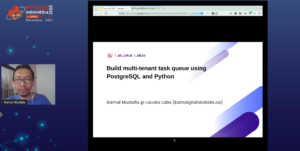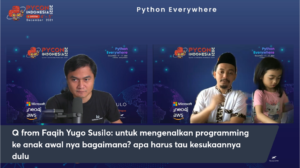Pycon Indonesia 2021 (PyconID) wrapped last Sunday over the weekend. It’a 2 days event with a full stream of talks on various topics related to the Python programming language.
The Python Indonesia community has been organizing this event since 2017 and in 2018 we managed to join the event in person in Jakarta. Unfortunately this year the conference has to be held online for a second time because of the pandemic.
This will be my second large online conference I’ve joined after the JomLaunch event in October this year [link]. It’s a good experience to see how different platforms are being used for both events. JomLaunch used Airmeet while Pycon ID used a combination of Streamyard and Hubilo.
Hubilo described themselves as a virtual event platform. In the context of PyconID, this is where participants will log in and see event’s schedule, join the presentation track and mingle with other attendees through chat and video call as provided by Room and Lounges features. This is quite similar to JomLaunch on Airmeet where the organizer provides a few “tables” that participants can “sit” on to have a chat with others.
It’s not quite clear why PyconID organizer decided to use Streamyard for the actual presentation which then streamed live to Hubilo. Could be Hubilo itself doesn’t has any conferencing tools. The downside of this is that there’s some “distance” between speakers and the audiences. The only interaction is via chat on Hubilo which the moderators will copy over to streamyard for the speakers to see.
At Streamyard, since everyone is in the same room, moderators can allow attendees to ask questions directly by voice by inviting them to the “stage” together with the speaker. It feels more connected this way.
My talk this time is on building a task queue using PostgreSQL and Python. It’s a topic that is close to my heart as back in Xoxzo, having a task queue with multi-tenant support is very crucial to the operations of the services. Unfortunately, the video recording of the talk is only available after two or three months according to the organizer.

Even though the event was online, it was actually hard for me to fully join the conference live as it was on the weekend and I had to juggle with other family stuff. Fortunately all the recording is available for the participants on Hubilo so I’m still catching up with some of the talks I think are interesting but didn’t manage to join the session live.
The first keynote session by Ainun Najib on teaching coding to kids is quite relatable to me. Not only is the topic interesting but I think the session was made more engaging by the moderator which is quite good in asking relevant questions. For a session that lacks direct audience participation, I think this is one of the crucial factors organizers can take notes on. Another talk on the related topics was from Andi Dinata titled “Unfold Python secret to students”. It’s from his talk that I learned that the Python turtle module can do so much more than I thought, it’s amazing!

Another thing I learned is about Pydantic as presented by Mas Fauzan, a Senior Engineering Manager at Noon ecommerce platform. I’m not sure yet how it can be used in practice but it’s something I want to look at further.
Chaos engineering is a topic that is on my watch list for quite some time. Karan Balkar’s talk gave me some sneak peek into using chaostoolkit to practice chaos engineering in your organization.
I’m still going through all the recordings and will share more if I find anything interesting.
